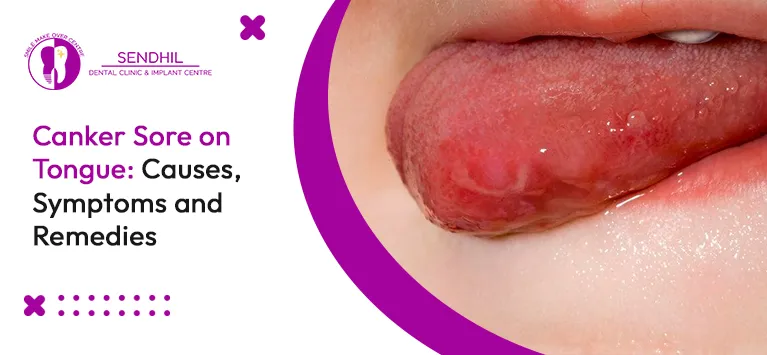
Canker Sore on Tongue
Small, painful lesions that appear on the soft tissues inside your mouth, under your tongue, or at the base of your gums are called canker sores, also referred to as aphthous ulcers. Canker sores appear inside the mouth and are not transmissible, in contrast to cold sores that are usually caused by the herpes virus and occur outside the mouth.
They can be extremely painful and make it difficult to eat, drink, or speak, but they are generally harmless. It can be easier to manage discomfort and stop canker sores in the future if you know what causes them, how to treat them, and how to avoid them.
Table of Contents
What Are Canker Sores?
Canker sores are small, round, or oval ulcers that have a red border and are either white or yellow in colour. The soft tissues of the mouth—the tongue, inner lips, cheeks, gums, roof of the mouth, and so on—are usually where they first appear. Canker sores on tongue come in different sizes, with the most common type being minor sores.
Small sores usually have a diameter of less than one centimetre and heal scar-free in one to two weeks. More significant, deeper sores that frequently leave scars can take up to six weeks to heal. The rarest type of sores are called herpetiformis, and they resemble groups of tiny ulcers.
Causes of Canker Sores
The canker sore tongue causes exact cause is still unknown. However, the following factors are the reasons for the development of canker sores:
- Injury or Trauma: Accidental bites to the cheek, aggressive brushing of the teeth, dental work, and biting of the tongue can all result in trauma that causes canker sores.
- Stress: Canker sore development is also associated with emotional stress and anxiety.
- Nutritional Deficiencies: Iron, zinc, vitamin B12, folic acid, and vitamin B12 deficiencies, in particular, can raise the risk of canker sores.
- Food Sensitivities: Canker sores can be triggered by a number of foods, including chocolate, coffee, nuts, citrus fruits, tomatoes, and acidic or spicy foods.
- Hormonal Changes: Some women may develop canker sores as a result of hormonal changes that occur during menstruation, pregnancy, or menopause.
- Underlying Health Conditions: repeated canker sores are linked to immune system disorders, ulcerative colitis, Crohn’s disease, and celiac disease.
- Genetic Factors: Given that canker sores frequently run in families, there may be a hereditary component.
Symptoms of Canker Sores
The most obvious sign of a canker sore is a painful oral ulcer. Additional signs and symptoms could be:
- A burning or tingling feeling before the sore arises.
- A circular, white, or yellow ulcer surrounded by red.
- Pain that gets worse when you eat, drink, or speak
- The lymph nodes swelling
- Fever (in severe situations)
How to Cure Canker Sores on Tongue
Although there isn’t a cure for canker sores, there are a few therapies that may reduce pain and speed up healing. The following are some efficient ways to treat canker sore on tongue:
Home Remedies:
- Salt Water Rinse: To reduce inflammation and encourage healing, rinse your mouth several times a day with a salt and warm water solution. Take a glass of warm water, Mix one teaspoon of salt in it, swish it around your mouth for thirty seconds, and then spit it out. Repeat this process every day, which increases the healing process.
- Baking Soda Rinse: Baking soda has anti-inflammatory and acid-neutralising properties. After rinsing your mouth for 30 seconds with a solution containing one teaspoon of baking soda and warm water, spit it out.
- Hydrogen Peroxide Solution: Apply hydrogen peroxide directly to the sore using a cotton swab after mixing it with equal parts water. This aids in bacterial reduction and improves healing.
- Honey: Honey is naturally anti-inflammatory and antibacterial. Several times a day, directly apply a small amount of honey to the canker sore on side of tongue.
- Coconut Oil: Rich in antimicrobial qualities, coconut oil helps relieve discomfort. Use a cotton swab to apply a small amount onto the sore.
- Aloe Vera: To ease pain and encourage healing, apply aloe vera gel directly to the sore.
Changes in Diet:
- Avoid Trigger Foods: Determine which foods, such as those that are spicy, acidic, or have a rough texture, cause canker sore on side of tongue and stay out of them.
- Consume a Balanced Diet: Make sure you are getting enough vitamins and minerals, especially iron, zinc, folic acid, and vitamin B12.
- Remain Hydrated: To keep your mouth moist and assist in healing, drink a lot of water.
Preventive Actions:
- Maintain Good Oral Hygiene: To prevent irritating the tissues in your mouth, brush and floss your teeth on a regular basis. Use a toothbrush with soft bristles.
- Manage Stress: Practise stress-reduction techniques such as meditation, yoga, or deep breathing exercises to help prevent stress-induced canker sores and sore tongue.
- Prevent Mouth Trauma: Use caution when eating to prevent biting your tongue or cheeks, and shut your mouth while you’re chewing to lower the possibility of an accidental cut.
Conclusion
In conclusion, although painful and irritating at times, canker sores on tongue are usually harmless and treatable with the proper attention. You can decrease the frequency and seriousness of canker sores and sore tongue and preserve better oral health by being aware of the possible causes, putting effective treatments into practice, and taking preventative measures. Get further examination and therapy from a healthcare provider if you suffer from severe or frequent sores.




